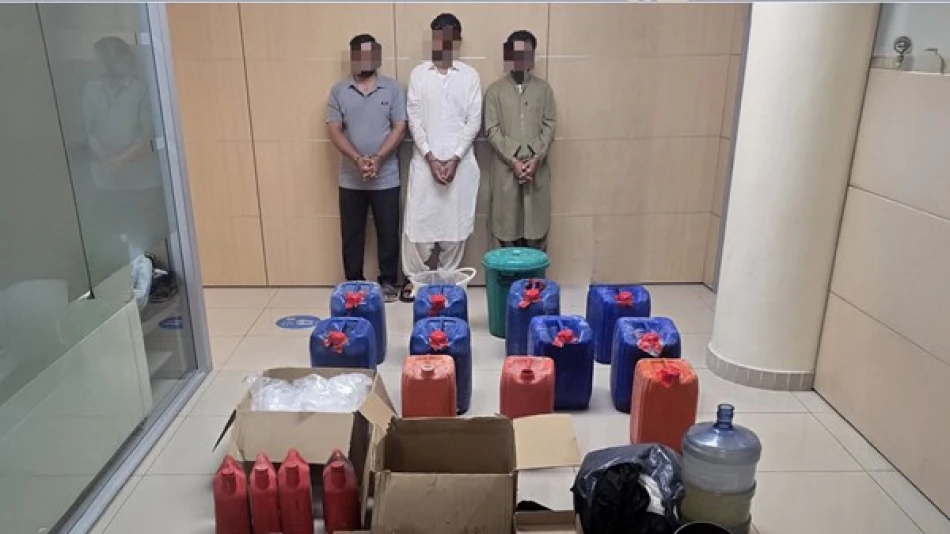
Abu Dhabi Police and National Anti-Narcotics Agency Bust Crystal Meth Drug Ring
UAE Drug Bust Reveals Sophisticated Crystal Meth Smuggling Operation Hidden in Sewing Machine Oil Containers
Abu Dhabi police have intercepted a major crystal methamphetamine smuggling operation, seizing 377 kilograms of the drug concealed in sewing machine oil containers. The bust, conducted jointly with the National Anti-Narcotics Agency, exposed the increasingly sophisticated methods drug cartels are using to penetrate the Gulf's strict border controls and highlights the UAE's growing role as both a transit hub and target market for international drug trafficking.
The Operation: Innovation Meets Enforcement
The three-person Asian trafficking cell demonstrated remarkable creativity in their concealment method, hollowing out industrial sewing machine oil containers to hide the substantial drug cache. This technique represents a significant evolution from traditional smuggling methods, suggesting organized crime groups are adapting to the UAE's enhanced security measures with more sophisticated approaches.
Colonel Taher Gharib Al Dhaheri, Director of the Anti-Narcotics Department, emphasized that despite the gang's innovative concealment strategy, the expertise of anti-drug officers proved decisive in uncovering the operation. The successful interdiction reflects years of investment in specialized training and detection capabilities within UAE law enforcement.
Regional Context: The Gulf as a Strategic Trafficking Route
This seizure fits into a broader pattern of drug trafficking through the Gulf states, where geographic location and robust trade infrastructure make countries like the UAE attractive transit points for narcotics flowing from Asia to Europe and North America. The choice of crystal methamphetamine is particularly significant, as this synthetic drug has seen explosive growth in regional markets over the past decade.
Comparative Regional Response
The UAE's approach mirrors similar crackdowns across the Gulf Cooperation Council states. Saudi Arabia has reported record seizures of amphetamines, while Qatar and Kuwait have strengthened their maritime interdiction capabilities. However, the UAE's position as a major logistics and re-export hub presents unique challenges that require constant adaptation of enforcement strategies.
Economic and Security Implications
For the UAE's economy, maintaining its reputation as a secure business environment is crucial for continued growth in trade, tourism, and financial services. Drug trafficking operations, if left unchecked, could undermine the country's carefully cultivated image as a stable, law-abiding jurisdiction attractive to international investment.
The scale of this seizure—377 kilograms represents millions of dollars in street value—suggests the UAE market itself may be becoming increasingly lucrative for traffickers, not merely serving as a transit point. This shift would require enhanced domestic prevention and treatment capabilities alongside enforcement efforts.
Technology and Tactics: An Arms Race
The sewing machine oil container method demonstrates how trafficking organizations continuously innovate to stay ahead of detection systems. This particular approach exploits the high volume of legitimate industrial goods flowing through UAE ports, making detection more challenging without sophisticated scanning and intelligence capabilities.
Law enforcement agencies worldwide face similar adaptive challenges, where each successful interdiction method prompts traffickers to develop new concealment techniques. The UAE's success in this case suggests their investment in both technology and human expertise is keeping pace with criminal innovation.
Public Health Dimension
Beyond the enforcement victory, authorities used this case to address growing concerns about drug normalization in society. The official warning against "misleading rumors and misconceptions" about drug use reflects awareness that successful interdiction must be coupled with effective prevention messaging, particularly as social media and changing cultural attitudes potentially increase experimentation among younger demographics.
The emphasis on community reporting through the dedicated hotline (8002626) indicates recognition that sustainable anti-drug efforts require public participation, not just law enforcement action. This community-based approach has proven effective in other Gulf states and represents a mature understanding of drug policy beyond purely punitive measures.
Most Viewed News

 Layla Al Mansoori
Layla Al Mansoori






